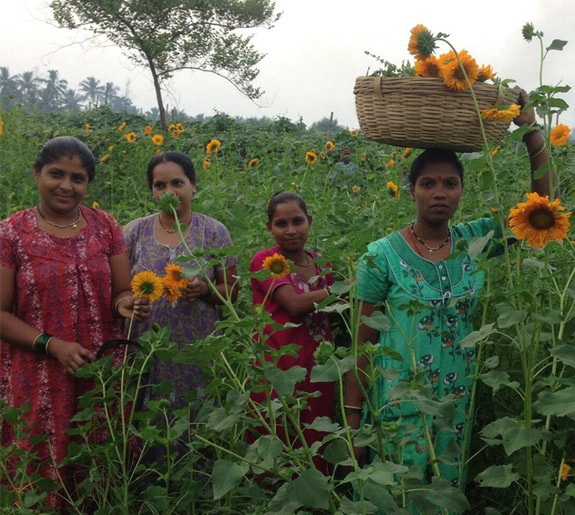Ranphul Mahila Mandal: Flowers in the Country
April 22, 2017
Away from the congestion and bustle of Mumbai's slums lies an area full of fields of blooming flowers. Behind this pretty picture, however, is a stark reality. In this undeveloped rural area, 50 km north of MarketPlace's office, women live in poverty with few options for employment. The main jobs are working in these fields picking flowers, backbreaking labor which pays extremely poorly.

In 2013, a group of women in this area completed a tailoring class conducted by the local nuns. MarketPlace-SHARE staff members made the 1½ hour journey from Mumbai to meet them and see if they might be interested in forming a cooperative and doing work for MarketPlace. This proposition was met with enthusiastic acceptance. The name the women chose for their new cooperative, Ranphul Mahila Mandal (RMM), refers to a jungle of flowers, a nod to their roots and potential growth.

The group started out with fifteen interested women, but some of them became discouraged by the preliminary steps required. When a group is being established, they must go through such formalities as registering their business and opening a bank account (not an easy task in India, especially for uneducated people lacking much documentation). They also must start out with several weeks of training. About half of the original number persevered, resolved to overcome any difficulties and discomfort. Currently, there are 7 members: 3 tailors/cutters and 4 embroidery artisans. They have plans to increase their numbers to 10 artisans over the next few months, and their progress supports this ambition.
The group may have started slowly, but they soon exceeded expectations, producing high-quality goods. Their first order was large, and they averaged about 3 times the normal salary. To help them get started, MarketPlace made them a loan, and they are already almost finished repaying it. At first, the women were very shy and conservative. They had never traveled by train. But they were determined and hard-working, committed to earning a living and improving their families' prospects. They learned to take the train all the way into Santacruz for a 3-month training program at MarketPlace. Some of the women even continue to pick flowers in the morning (when it is not so hot) before they come to work at RMM.

In Mumbai, they were excited to meet with the more-established groups to learn what they could to make a successful cooperative. One thing they picked up on was the idea of solidarity and how the other groups celebrate birthdays and festivals together - a tradition RMM has happily adopted. The other artisans also reinforced the advantages of saving money for important expenses. One RMM artisan lived in a house without a toilet, so she used some of her savings to build an indoor toilet.
At RMM, the women have learned how to work well together. When they disagree, it is their custom to discuss any issues immediately to resolve the conflict. Their focus is on helping one another finish assignments on time. The manager, Mary, is good at motivating the other women to take on challenges. She has given part of her own house to serve as the RMM workplace. Living in the countryside does involve some interesting differences in this group. The women can climb trees and they get themselves to work on bicycles or motorbikes.

